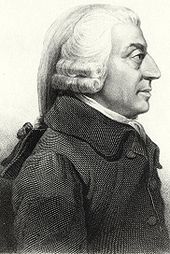Economic liberalism
| Part of a series on |
| Capitalism |
|---|
| Part of a series on |
| Liberalism |
|---|
 |
Economic liberalism is a
Economic liberalism is associated with markets and private ownership of
Economic liberalism can be contrasted with
Origin and early history

Developed during the
The early theory of economic liberalism was based on the assumption that the economic actions of individuals are largely based on self-interest (
Initial opposition
Initially, the economic liberals had to contend with arguments from the supporters of feudal privileges for the wealthy, traditions of the aristocracy and the rights of monarchs to run national economies in their own personal interests. By the end of the 19th century and the beginning of the 20th century, this opposition was largely defeated in the primary capital markets of Western countries.
The
Contrast with other economic philosophies
Contrast between British and American views
Historian Kathleen G. Donohue argues that
Limits of influence and influence on other perspectives
In its initial formation, economic liberalism was focused on promoting the idea of private ownership and trade; however, due to a growing awareness of concerns regarding policy, the rise of economic liberalism paved the way for a new form of liberalism, known as social liberalism. This promoted an accommodation for government intervention in order to help the poor. As subsequent authors picked up and promoted widespread appeal of a subset of Smith's economic theories to support their own work—of free trade, the division of labour, and the principle of individual initiative—this contributed to obscuring other aspects of the rich body of political liberalism to be found in Smith's work. For example, his work promoted the ideal that the everyday man could hold ownership of his own property and trade, which Smith felt would slowly allow for individuals to take control of their places within society.
Economic liberalism and fiscal liberalism (conservatism)
Economic liberalism is a much broader concept than fiscal liberalism, which is called fiscal conservatism or economic libertarianism in the United States.[12] The ideology that highlighted the financial aspect of economic liberalism is called fiscal liberalism, which is defined as support for free trade.[13]
Position on state interventionism
Economic liberalism opposes government intervention in the economy when it leads to inefficient outcomes.
See also
References
- ^ a b Adams 2001, p. 20.
- ^ ISBN 978-1351034647. Archivedfrom the original on 2021-07-21. Retrieved 2021-07-21.
- S2CID 146351369.
- ^ Boudreaux, Don (2015-03-31). "Milton Friedman on the Real World Effects of Labor Unions". Cafe Hayek. Archived from the original on 2020-11-25. Retrieved 2020-10-13.
- ^ Brown, Wendy (2005). Edgework: Critical Essays on Knowledge And Politics. Princeton University Press. p. 39..
- ISBN 978-1107041530. Archivedfrom the original on 2021-07-26. Retrieved 2021-07-26.
- ^ Aaron, Eric (2003). What's Right?. Dural, Australia: Rosenberg Publishing. p. 75.
- ^ Butler 2015, p. 10.
- ^ Walford v Miles [1992] 2 A.C. 128
- ^ Paul Bairoch (1995). Economics and World History: Myths and Paradoxes. University of Chicago Press. pp. 31–32. Archived from the original on 2017-10-12. Retrieved 2017-08-16.
- ISBN 978-0801883910. Archivedfrom the original on 2021-02-01. Retrieved 2016-12-03.
- ISBN 978-1135923112.
- ISBN 978-0191514449.
Hence the emphasis today on the study of political economy, and the identification of Gladstone with 'fiscal liberalism', defined above all as the liberalism of free trade.
- ^ Turner 2008, pp. 60–61.
- ^ a b Turner 2008, pp. 83–84.
- ^ a b Balaam & Dillman 2015, p. 48.
Bibliography
- Adams, Ian (2001). Political Ideology Today. Manchester University Press. ISBN 978-0719060205.
- Balaam, David N; Dillman, Bradford (2015). Introduction to International Political Economy. Routledge. ISBN 978-1317347309.
- Butler, Eamonn (2015). Classical Liberalism – A Primer. Do Sustainability. ISBN 978-0255367080.
- Turner, Rachel S. (2008). Neo-Liberal Ideology: History, Concepts and Policies. Edinburgh University Press. ISBN 978-0748688685.
External links
 Quotations related to Economic liberalism at Wikiquote
Quotations related to Economic liberalism at Wikiquote Media related to Economic liberalism at Wikimedia Commons
Media related to Economic liberalism at Wikimedia Commons
